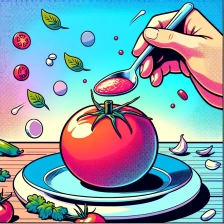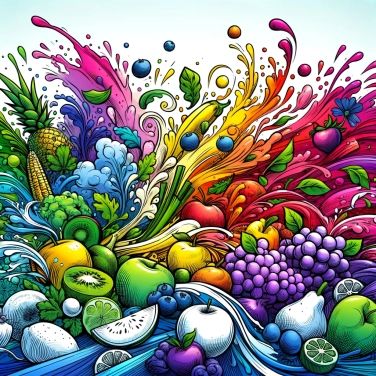In detail, for those interested!
High antioxidant power
Colorful fruits and vegetables are rich in antioxidants, compounds that help protect the body's cells against damage caused by free radicals. Free radicals are unstable molecules produced in the body in response to stress, pollution, and other environmental factors. The accumulation of free radicals can lead to oxidative stress, which damages cells and may contribute to the development of chronic diseases such as cancer, heart disease, and premature aging. Colorful fruits and vegetables contain a variety of antioxidants such as flavonoids, carotenoids, and vitamin C that help neutralize free radicals and reduce oxidative damage in the body. Therefore, including a variety of colorful fruits and vegetables in one's diet can help strengthen the body's antioxidant power and promote optimal health.
Supply of essential vitamins and minerals
Colorful fruits and vegetables are an excellent source of vitamins and essential minerals for our bodies. Indeed, these foods are full of nutrients essential for our health. Vitamins such as vitamin C, vitamin A, and vitamin K are present in significant amounts in many colorful fruits and vegetables. These vitamins are essential for the proper functioning of our immune system, the health of our skin, eyes, and blood clotting. Additionally, minerals found in colorful fruits and vegetables, such as potassium, magnesium, and iron, are also crucial for our overall health. For example, potassium is important for regulating blood pressure and the proper functioning of muscles and nerves. Similarly, iron is essential for the formation of red blood cells and the transport of oxygen in our bodies. By including a variety of colorful fruits and vegetables in our diet, we ensure that we benefit from an adequate intake of vitamins and essential minerals for our overall well-being.
Reduction of the risk of chronic diseases
Colorful fruits and vegetables are associated with a reduced risk of chronic diseases. Their regular consumption is linked to a decrease in the incidence of diseases such as cancer, cardiovascular diseases, type 2 diabetes, and neurodegenerative diseases. Antioxidants present in colorful fruits and vegetables help protect cells against damage caused by free radicals, thus helping to prevent inflammation and oxidative stress, two important factors in the development of chronic diseases. Phytochemical compounds present in these foods also have beneficial effects on health, acting as anti-inflammatory agents and regulating various biological processes involved in the development of chronic diseases. In addition, dietary fibers present in colorful fruits and vegetables can help maintain a healthy weight and reduce the risk of obesity-related diseases, such as type 2 diabetes and cardiovascular diseases. By incorporating a variety of colorful fruits and vegetables into one's daily diet, one can significantly contribute to the prevention of chronic diseases and overall health improvement.
Improvement of cardiovascular health
Colorful fruits and vegetables are rich in compounds beneficial for cardiovascular health. Flavonoids, found in large quantities in colorful fruits and vegetables, have anti-inflammatory and antioxidant properties, which help improve the health of blood vessels and reduce the risk of cardiovascular diseases. Soluble fibers found in these foods promote the reduction of blood cholesterol, which is essential for preventing heart diseases. Additionally, regular consumption of colorful fruits and vegetables is associated with a decrease in blood pressure, which is a key factor in maintaining good cardiovascular health. Antioxidants, such as vitamins C and E, found in colorful fruits and vegetables, protect cells from oxidative stress and help maintain heart health. In summary, including a variety of colorful fruits and vegetables in one's daily diet helps improve cardiovascular health and reduce the risks of heart diseases.
![Explain why some countries change time zones?]()
![Explain why Alexander the Great refused to wear shoes.]()
![Explain why Alexander the Great always wore an impressive helmet.]()
![Explain why the last Chinese emperor was so young when he came to power?]()





















